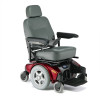Invacare M91 Owners Manual - Page 20
Safety/handling Of, Wheelchairs
 |
View all Invacare M91 manuals
Add to My Manuals
Save this manual to your list of manuals |
Page 20 highlights
SECTION 3-SAFETY/HANDLING OF WHEELCHAIRS SECTION 3-SAFETY/HANDLING OF WHEELCHAIRS "Safety and Handling" of the wheelchair requires the close attention of the wheelchair user as well as the assistant. This manual points out the most common procedures and techniques involved in the safe operation and maintenance of the wheelchair. It is important to practice and master these safe techniques until you are comfortable in maneuvering around the frequently encountered architectural barriers. Use this information only as a "basic" guide. The techniques that are discussed on the following pages have been used successfully by many. Individual wheelchair users often develop skills to deal with daily living activities that may differ from those described in this manual. Invacare recognizes and encourages each individual to try what works best for him/her in overcoming architectural obstacles that they may encounter, however ALL WARNINGS and CAUTIONS given in this manual MUST be followed. Techniques in this manual are a starting point for the new wheelchair user and assistant with "safety" as the most important consideration for all. Stability and Balance ƽ WARNING ALWAYS wear your seat positioning strap. The seat positioning strap is a positioning belt ONLY. It is not designed for use as a safety device withstanding high stress loads such as auto or aircraft safety belts. If signs of wear appear, belt must be replaced IMMEDIATELY. DO NOT climb, go up or down ramps or traverse slopes greater than 9°. Invacare strongly recommends proceeding down ramps or slopes at half speed or slower and to avoid hard braking or sudden stops. DO NOT leave elevating legrests in the fully extended position when proceeding down ramps or slopes. Proper positioning is essential for your safety. When reaching, leaning, bending or bending forward, it is important to use the casters as a tool to maintain stability and balance. DO NOT attempt to reach objects if you have to move forward in the seat or pick them up from the floor by reaching down between your knees. Be aware that carrying heavy objects on your lap while occupying the wheelchair may adversely affect the stability of the wheelchair, resulting in serious bodily injury to the user, damage to the wheelchair and surrounding property. This wheelchair has been designed to accommodate one individual. If more than one individual occupies the wheelchair this may adversely affect the stability of the wheelchair, resulting in serious bodily injury to the user and passenger and damage to the wheelchair and surrounding property. Pronto® M91™ with SureStep® 20 Part No 1141450















